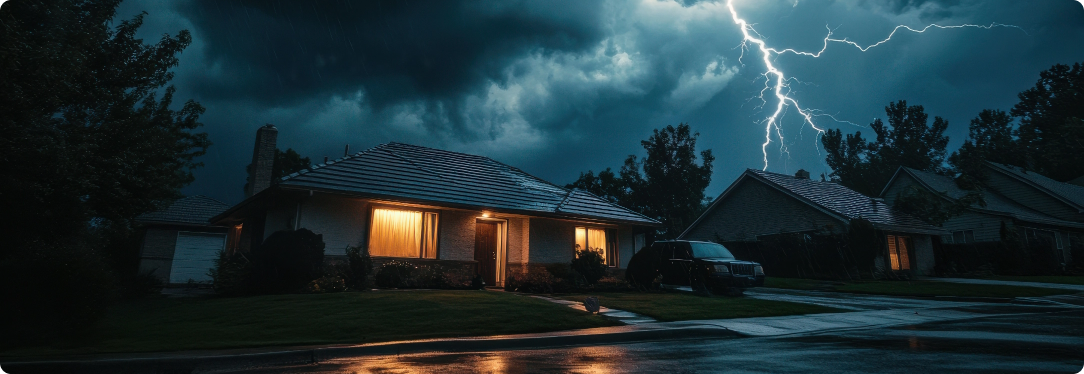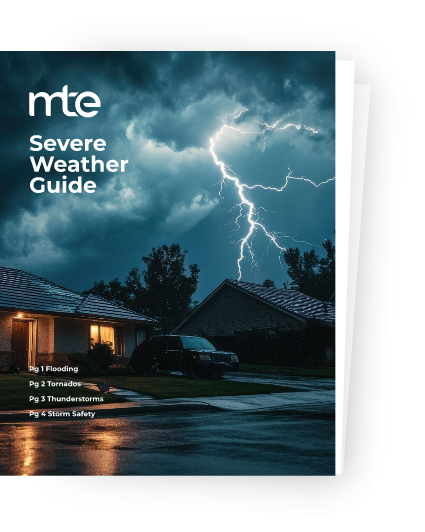
Body
Severe Thunderstorms, Winds and Tornadoes
Severe thunderstorms are frequent in Tennessee, particularly during the spring and summer months. These storms can bring heavy rainfall, strong winds, hail and tornadoes, posing significant threats to safety, power lines and the electrical grid. It’s important to know how to prepare your family for severe storms and the chance of tornadoes that can come with them.
What to do
- Establish an Emergency Plan for your household and be sure everyone knows it.
- Identify your safe shelter area, ideally a basement or an interior room on the lowest floor of your home with no windows.
- Monitor weather alerts and severe thunderstorm warnings.
- Have a NOAA Weather Radio and make sure it’s turned on.
- Sign up for emergency notifications from your local Emergency Management Agency. Visit mte.com/EMA to find information for your county.
- Have an Emergency Kit prepared.
- View a list of recommended items from TEMA and the American Red Cross here. (link to PDF of Emergency Kit Checklist)
- Secure outdoor furniture and objects that could be blown away.
- Trim trees and remove dead branches that could fall on power lines.
- Unplug any electronic devices you want to protect from power surges.
- Ensure your sump pump is working properly and clear drains to prevent flooding.
- Keep your phone charged and have a fully charged portable charger on hand.
- Understand the difference between ‘Watch’ and a ‘Warning’
- Severe Thunderstorm Watch = Severe storms are possible. Be prepared.
- Severe Thunderstorm Warning = A severe thunderstorm is expected to occur or is occurring. Seek shelter.
- Tornado Watch = Tornadoes are possible in and near the watch area. Have supplies and a safe space prepared to act quickly if needed.
- Tornado Warning = A tornado has been sighted or indicated by weather radar. Move to your safe space.
- Stay indoors, staying away from windows and exterior doors.
- Be prepared to head to your safe space in the event of a Tornado Warning.
- Have your Emergency Kit with you. It’s also recommended to put on good shoes and to wear a helmet or grab pillows to cover your head with.
- Take your pets with you and have a pet carrier for cats/small dogs/other small pets.
- Avoid using electronics or electrical appliances.
- Keep people and pets at least 30 feet away from downed power lines. Don’t touch anything in contact with a downed line, such as a car, tree or fence. Please report a downed line to MTE immediately by calling 877-777-9020.
- Report any power outages to MTE via the myMTE app or by calling 877-777-0215.
- If you do lose power, keep your refrigerator and freezer closed to preserve food. According to the US Department of Agriculture, food in the fridge will last up to four hours, and a full freezer will be safe for 48 hours.
- Never operate a generator inside your home. Always keep it outside for proper ventilation.
- Use a battery-operated CO detector.
- Only a qualified, licensed electrician should attempt to connect a generator to your home or business’s main electric panel. If connected improperly, power can “backfeed” onto utility lines, creating a dangerous situation for line crews.
- Inspect your property for damage. Take photos and file a claim with insurance if necessary.
- Check for injuries and do not attempt to move seriously injured people unless they are in immediate danger of further injury. Get medical assistance ASAP.
- If you are trapped, try to attract attention to yourself. Send a text, bang on a wall or pipe or use a whistle to help rescuers find you.
- Check gas, electrical and water lines for damage.
- If you see frayed wiring or spars or if there is a burning odor, immediately shut off power at the main circuit breaker.
- Do not use matches, lighters, appliances or light switches until you are sure there are no gas leaks.

